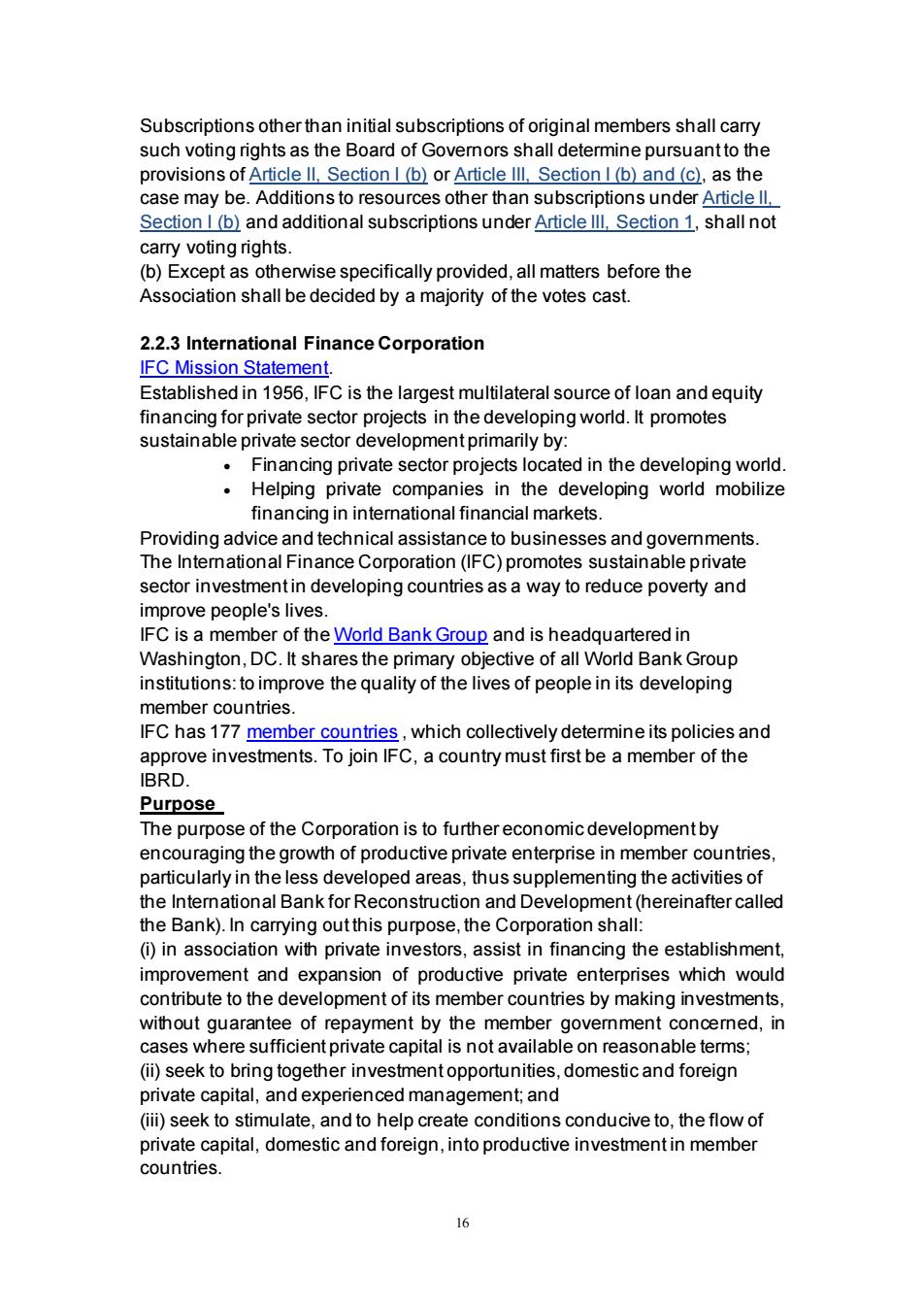
Subscriptions other than initial subscriptions of original members shall camy such voting rights as e Board of Go shall dete ne pu rsuantto the provisions of Articlell,Section I(b)or Article Il,Section I(b)and (c).as the case may be.Additions to resources other than subscriptions under Article ll. Section I (b)and additional subscriptions under Article Ill,Section 1,shall not carry voting rights. (b) ot a otherwise specifically provided,all matters before the Association shall be decided by a majority of the votes cast 2.2.3 International Finance Corporation IFC Mission Statement. Established in 1956,IFC is the largest multilateral source of loan and equity finan ing for priva e.promotes sustainable private sector development primarily by: Financina private sector projects located in the developing world Helping private companies in the developing world mobilize financing in international financial markets Providing advic ical assistance to busine sses and governme nts The Interna onal Finance Corporation(IFC)promotes sustainable private sector investment in developing countries as a way to reduce poverty and improve people's lives. IFC is a member of the World Bank Group and is headquartered in Washington,DC.It shares the primary institutions:to improve the quality of the lives of people in its developing member countries IFC has 177 member countries,which collectively determine its policies and approve investments.To join IFC,a country must first be a member of the RRD Purpose The purpose of the Corporation is to further economic development by encouraging the growth of productive private enterprise in member countries particularly in the less developed areas,thus supplementing the activities of the Intemational Bank for Reconstruction and Development(hereinafter called the Bank)In carrying outthis purpose,the Corpo atio shall: (i)in associ with private investors ssist in financing the establishmen improvement and expansion of productive private enterprises which would contribute to the development of its member countries by making investments, without quarantee of repayment by the member govemment concemed.in cases where sufficient private capital is not available on reasonable terms: ()seek to bringtogether inves nent opportunities domestic and foreigr private capital,and experienced management;and (iii)seek to stimulate,and to help create conditions conducive to,the flow of private capital,domestic and foreign,into productive investment in member countries
16 Subscriptions other than initial subscriptions of original members shall carry such voting rights as the Board of Governors shall determine pursuant to the provisions of Article II, Section I (b) or Article III, Section I (b) and (c), as the case may be. Additions to resources other than subscriptions under Article II, Section I (b) and additional subscriptions under Article III, Section 1, shall not carry voting rights. (b) Except as otherwise specifically provided, all matters before the Association shall be decided by a majority of the votes cast. 2.2.3 International Finance Corporation IFC Mission Statement. Established in 1956, IFC is the largest multilateral source of loan and equity financing for private sector projects in the developing world. It promotes sustainable private sector development primarily by: • Financing private sector projects located in the developing world. • Helping private companies in the developing world mobilize financing in international financial markets. Providing advice and technical assistance to businesses and governments. The International Finance Corporation (IFC) promotes sustainable private sector investment in developing countries as a way to reduce poverty and improve people's lives. IFC is a member of the World Bank Group and is headquartered in Washington, DC. It shares the primary objective of all World Bank Group institutions: to improve the quality of the lives of people in its developing member countries. IFC has 177 member countries , which collectively determine its policies and approve investments. To join IFC, a country must first be a member of the IBRD. Purpose The purpose of the Corporation is to further economic development by encouraging the growth of productive private enterprise in member countries, particularly in the less developed areas, thus supplementing the activities of the International Bank for Reconstruction and Development (hereinafter called the Bank). In carrying out this purpose, the Corporation shall: (i) in association with private investors, assist in financing the establishment, improvement and expansion of productive private enterprises which would contribute to the development of its member countries by making investments, without guarantee of repayment by the member government concerned, in cases where sufficient private capital is not available on reasonable terms; (ii) seek to bring together investment opportunities, domestic and foreign private capital, and experienced management; and (iii) seek to stimulate, and to help create conditions conducive to, the flow of private capital, domestic and foreign, into productive investment in member countries
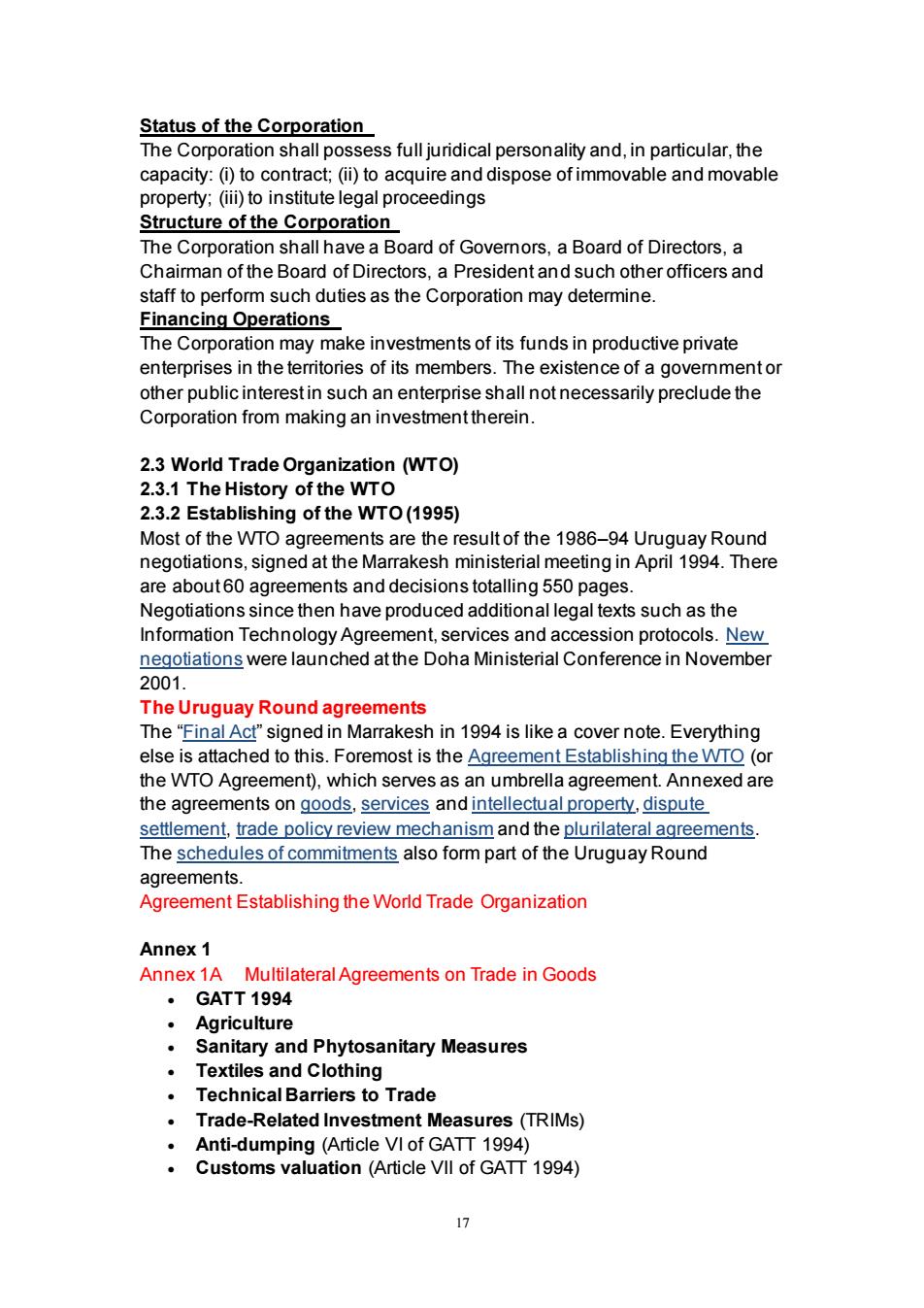
Status of the Corporation The Corporation shall possess full juridical personality and,in particular,the capacity:(i)t contract:(ii)to acquire and dispose ofimmovable and movable property:(iii)to institute legal proceedings Structure of the Corporation The Corporation shall have a Board of Governors,a Board of Directors,a Chairman of the Board of Directors,a President and such other officers and staff to pe such duties as the Corporation may determine Financing Operations The Corporation may make investments of its funds in productive private enterprises in the territories of its members.The existence of a government or other public interest in such an enterprise shall not necessarily preclude the Corporation from making an investment therein 2.3 World Trade Organization (WTO) 2.3.1 The History of the WTO 2.3.2 Establishing of the WTO(1995) Most of the WTO agre ments are 4 Uruguay Round negotia ations,signed at the Ma ministerial ting in April 994.There are about60 agreements and decisions totalling 550 pages. Negotiations since then have produced additional legal texts such as the Information Technology Agreement,services and accession protocols.New egiations were launched at the Doha Ministerial Conference in November The Uruguay Round agreements The "Final Act"signed in Marrakesh in 1994 is like a cover note.Everything else is attached to this.Foremost is the Agreement Establishing the WTO(or the WTO Agreement),which serves as an umbrella agreement.Annexed are the agreements on goods,services and intelle ectual p operty dispute settlement,trade policy review mechanism and the plurilateral agreements The schedules of commitments also form part of the Uruguay Round aareements. Agreement Establishina the World Trade Organization Annex 1 Annex 1A Multilateral Agreements on Trade in Goods .GATT 1994 ·Agriculture Sanitary and Phytosanitary Measures Textiles ar Clothin Tech nnical Barriers to Trade Trade-Related Investment Measures (TRIMs) Anti-dumping (Article VI of GATT 1994) Customs valuation (Article Vll of GATT 1994) 1
17 Status of the Corporation The Corporation shall possess full juridical personality and, in particular, the capacity: (i) to contract; (ii) to acquire and dispose of immovable and movable property; (iii) to institute legal proceedings Structure of the Corporation The Corporation shall have a Board of Governors, a Board of Directors, a Chairman of the Board of Directors, a President and such other officers and staff to perform such duties as the Corporation may determine. Financing Operations The Corporation may make investments of its funds in productive private enterprises in the territories of its members. The existence of a government or other public interest in such an enterprise shall not necessarily preclude the Corporation from making an investment therein. 2.3 World Trade Organization (WTO) 2.3.1 The History of the WTO 2.3.2 Establishing of the WTO (1995) Most of the WTO agreements are the result of the 1986–94 Uruguay Round negotiations, signed at the Marrakesh ministerial meeting in April 1994. There are about 60 agreements and decisions totalling 550 pages. Negotiations since then have produced additional legal texts such as the Information Technology Agreement, services and accession protocols. New negotiations were launched at the Doha Ministerial Conference in November 2001. The Uruguay Round agreements The “Final Act” signed in Marrakesh in 1994 is like a cover note. Everything else is attached to this. Foremost is the Agreement Establishing the WTO (or the WTO Agreement), which serves as an umbrella agreement. Annexed are the agreements on goods, services and intellectual property, dispute settlement, trade policy review mechanism and the plurilateral agreements. The schedules of commitments also form part of the Uruguay Round agreements. Agreement Establishing the World Trade Organization Annex 1 Annex 1A Multilateral Agreements on Trade in Goods • GATT 1994 • Agriculture • Sanitary and Phytosanitary Measures • Textiles and Clothing • Technical Barriers to Trade • Trade-Related Investment Measures (TRIMs) • Anti-dumping (Article VI of GATT 1994) • Customs valuation (Article VII of GATT 1994)
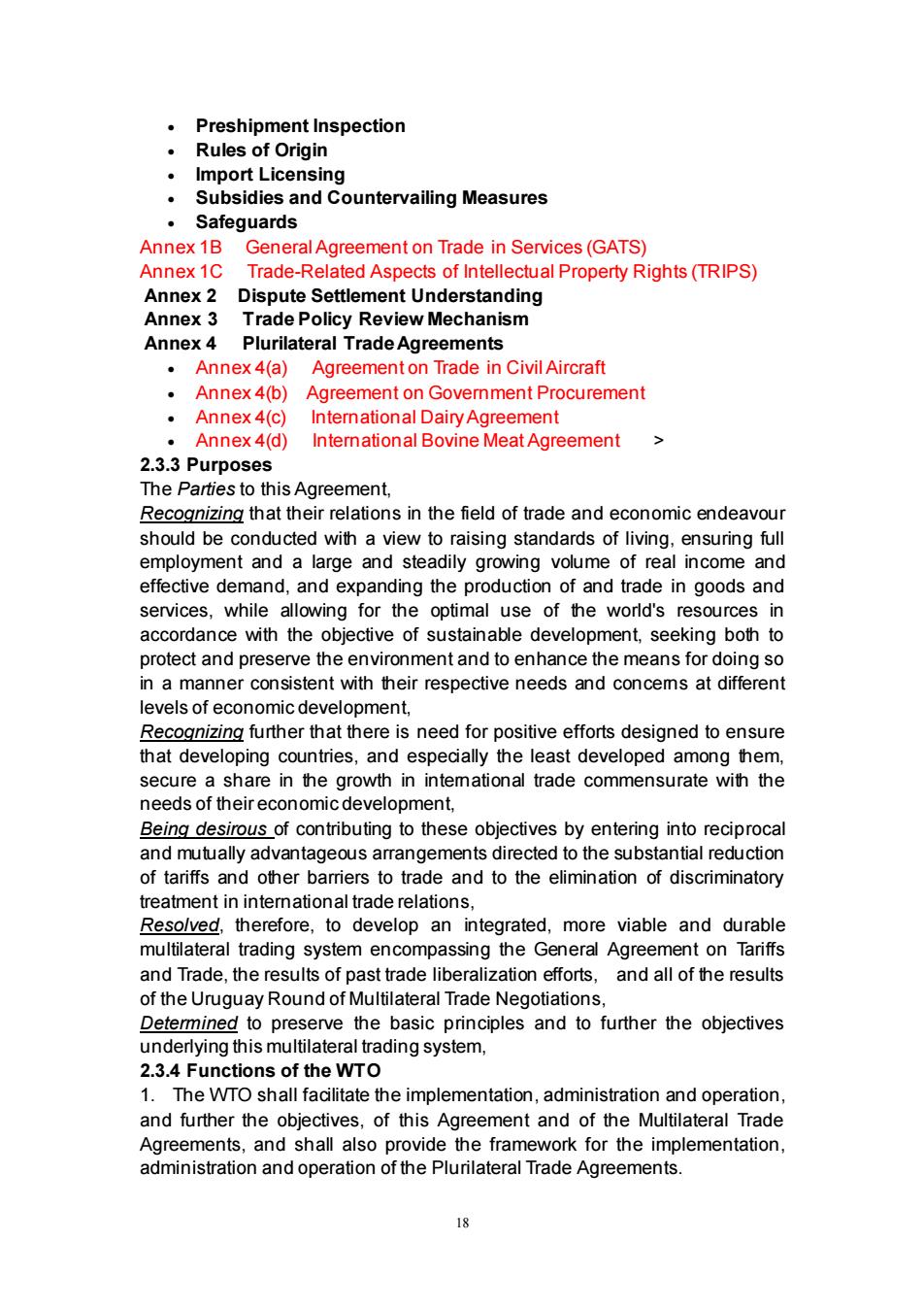
Preshipment Inspection Rules of Origin Import Licensing Subsidies and Countervailing Measures ·Safeguards Annex 1B GeneralAar eement on Trade in services(GATS) Annex 1C Trade-Rel ate ed A cts of Intel tual Property Rights(TRIPS) Annex 2 Dispute S ettle Annex 3 Trade Policy Review Mechanism Annex 4 Plurilateral Trade Agreements Annex 4(a)Agreementon Trade in Civil Aircraft ·Annex4b) reement on Government Procurement Annex 4(c Annex 4(d) Intemnational Bovine Meat Agreement 2.3.3 Purposes The Parties to this Agreement, Recognizing that their relations in the field of trade and economic endeavour should b with raising stand ds of employmentadlge and stead growing votume of rem an effective demand,and expanding the production of and trade in goods and services,while allowing for the optimal use of the world's resources in accordance with the obiective of sustainable development seekina both to enviro nment and to enhar nce the mear ns for doing so in a manner consistent with the ir respective needs and concems at differen levels of economic development Recognizing further that there is need for positive efforts designed to ensure that developing countries.and especially the least developed among them. secure a share in the growth in intemational trade commensurate with the needs of theireconom velopment. Being desirous of contributing to these objectives by enterng into reciproca and mutually advantageous arrangements directed to the substantial reduction of tariffs and other barriers to trade and to the elimination of discriminatory treatment in international trade relations Resolved,therefore,to develop an integrated,more viable and durable multila ral trading system enco mpassing the Genera Agreement on Tariffs and Trade.the results of past trade liberalization efforts and all of the results of the Uruguay Round of Multilateral Trade Negotiations Detemmined to preserve the basic principles and to further the obiectives underlying this multilateral trading system. 234F f the WTO The WTO shall facilitate the implementation,administration and operation and further the objectives,of this Agreement and of the Multilateral Trade Agreements,and shall also provide the framework for the implementation. administration and operation of the Plurilateral Trade Agreements. 18
18 • Preshipment Inspection • Rules of Origin • Import Licensing • Subsidies and Countervailing Measures • Safeguards Annex 1B General Agreement on Trade in Services (GATS) Annex 1C Trade-Related Aspects of Intellectual Property Rights (TRIPS) Annex 2 Dispute Settlement Understanding Annex 3 Trade Policy Review Mechanism Annex 4 Plurilateral Trade Agreements • Annex 4(a) Agreement on Trade in Civil Aircraft • Annex 4(b) Agreement on Government Procurement • Annex 4(c) International Dairy Agreement • Annex 4(d) International Bovine Meat Agreement > 2.3.3 Purposes The Parties to this Agreement, Recognizing that their relations in the field of trade and economic endeavour should be conducted with a view to raising standards of living, ensuring full employment and a large and steadily growing volume of real income and effective demand, and expanding the production of and trade in goods and services, while allowing for the optimal use of the world's resources in accordance with the objective of sustainable development, seeking both to protect and preserve the environment and to enhance the means for doing so in a manner consistent with their respective needs and concerns at different levels of economic development, Recognizing further that there is need for positive efforts designed to ensure that developing countries, and especially the least developed among them, secure a share in the growth in international trade commensurate with the needs of their economic development, Being desirous of contributing to these objectives by entering into reciprocal and mutually advantageous arrangements directed to the substantial reduction of tariffs and other barriers to trade and to the elimination of discriminatory treatment in international trade relations, Resolved, therefore, to develop an integrated, more viable and durable multilateral trading system encompassing the General Agreement on Tariffs and Trade, the results of past trade liberalization efforts, and all of the results of the Uruguay Round of Multilateral Trade Negotiations, Determined to preserve the basic principles and to further the objectives underlying this multilateral trading system, 2.3.4 Functions of the WTO 1. The WTO shall facilitate the implementation, administration and operation, and further the objectives, of this Agreement and of the Multilateral Trade Agreements, and shall also provide the framework for the implementation, administration and operation of the Plurilateral Trade Agreements
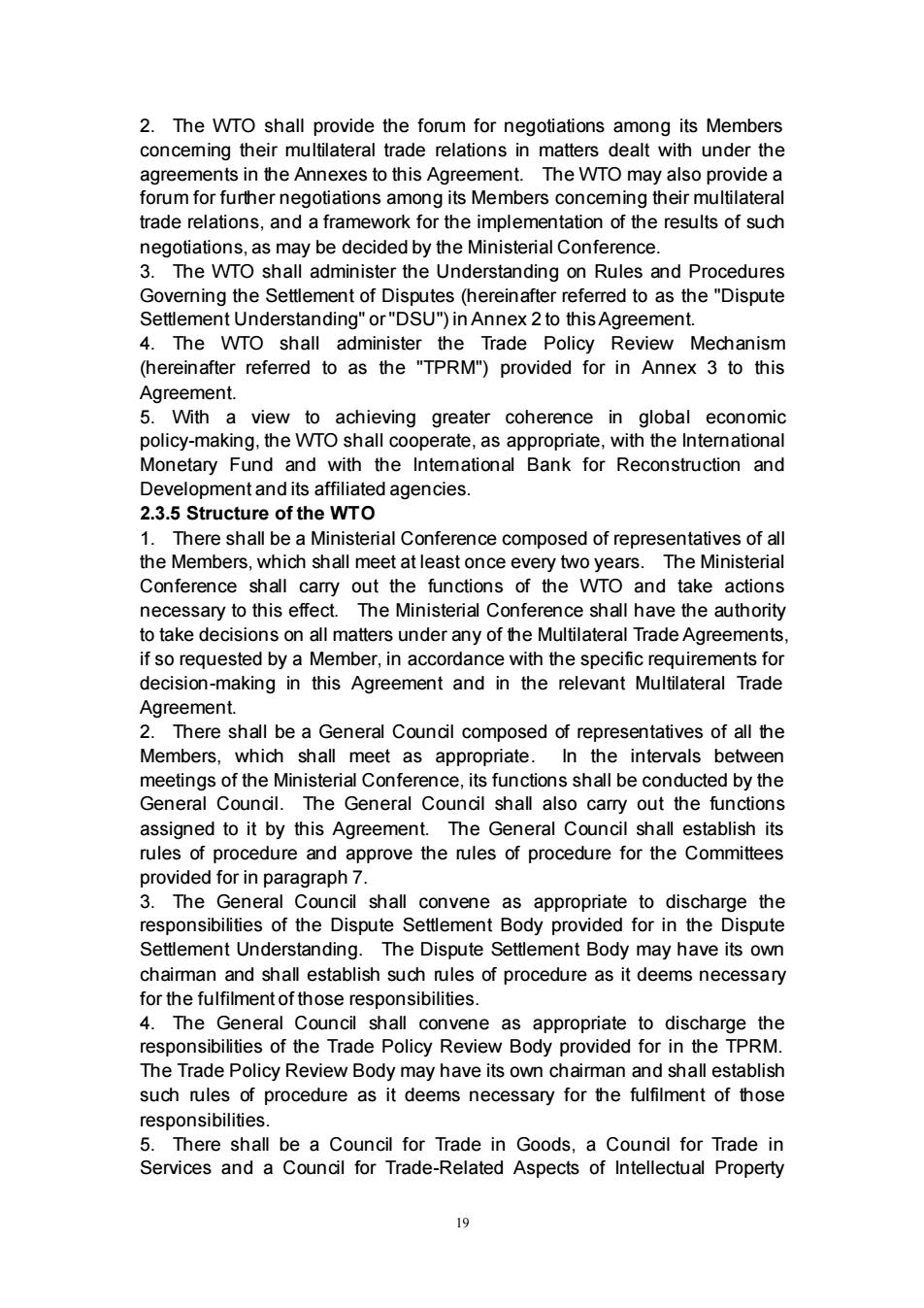
2.The WTO shall provide the forum for negotiations among its Members conceming their mulilateral trade relations in matters dealt with under the agreem ents in the Annexes to this Agreement The WTO may also provide forum for further negotiations among its Members conceming their multilateral trade relations.and a framework for the implementation of the results of such neaotiations.as may be decided by the ministerial Conference 3.The WTO shall administer the Understanding on Rules and Procedures t of Dis eferred to as the "Dispute nderstanding"or"DSU")in Annex 2 to this Agree 4.The WTO shall administer the Trade Policy Review Mechanism (hereinafter referred to as the "TPRM")provided for in Annex 3 to this Aareement 5.With t o achiev olicy-ma ing,the w ing greater coherenc in global cooperate,as appropriat e,with the Intemationa Monetary Fund and with the Intemational Bank for Reconstruction and Development and its affiliated agencies. 2.3.5 Structure of the WTO 1.There shall be a Ministerial Confere ch ce composed of ntatives of all the Memb rs,wh shall meet at least epres nce et very two ye The Ministeria Conference shall carry out the functions of the WTO and take actions necessary to this effect.The Ministerial Conference shall have the authority to take decisions on all matters under any of the Multilateral Trade Agreements if so requested by a Member,in accordance with the specific requirements for decisio king in this Agreement and in the relevar nt Multilateral T rade Agreement 2.There shall be a General Council composed of representatives of all the Members,which shall meet as appropriate. In the intervals between meetings of the Ministenal Conference.is functions shall be conducted by the l Council The General Council shall also carrv out the functions assigned to it by this Agreement. The General Council shal establish its rules of procedure and approve the rules of procedure for the Committees provided for in paragraph 7. 3.The General Council shall convene as appropriate to discharge the responsibilities of the Dispute Settlement Body provided for in the Dispute Settlement Ur standing. The Dispute Settlemen Body may have its own chaimman and shall establish such rules of procedure as it deems necessary for the fulfilment of those responsibilities. 4.The General Council shall convene as appropriate to discharge the responsibilities of the Trade Policy Review Body provided for in the TPRM. The Trade Policy Re iew bodv y have its own chai such rules of procedure as it deems necessary for the t ulfilment of thos responsibilities. 5.There shall be a Council for Trade in Goods,a Council for Trade in Services and a Council for Trade-Related Aspects of Intellectual Property 19
19 2. The WTO shall provide the forum for negotiations among its Members concerning their multilateral trade relations in matters dealt with under the agreements in the Annexes to this Agreement. The WTO may also provide a forum for further negotiations among its Members concerning their multilateral trade relations, and a framework for the implementation of the results of such negotiations, as may be decided by the Ministerial Conference. 3. The WTO shall administer the Understanding on Rules and Procedures Governing the Settlement of Disputes (hereinafter referred to as the "Dispute Settlement Understanding" or "DSU") in Annex 2 to this Agreement. 4. The WTO shall administer the Trade Policy Review Mechanism (hereinafter referred to as the "TPRM") provided for in Annex 3 to this Agreement. 5. With a view to achieving greater coherence in global economic policy-making, the WTO shall cooperate, as appropriate, with the International Monetary Fund and with the International Bank for Reconstruction and Development and its affiliated agencies. 2.3.5 Structure of the WTO 1. There shall be a Ministerial Conference composed of representatives of all the Members, which shall meet at least once every two years. The Ministerial Conference shall carry out the functions of the WTO and take actions necessary to this effect. The Ministerial Conference shall have the authority to take decisions on all matters under any of the Multilateral Trade Agreements, if so requested by a Member, in accordance with the specific requirements for decision-making in this Agreement and in the relevant Multilateral Trade Agreement. 2. There shall be a General Council composed of representatives of all the Members, which shall meet as appropriate. In the intervals between meetings of the Ministerial Conference, its functions shall be conducted by the General Council. The General Council shall also carry out the functions assigned to it by this Agreement. The General Council shall establish its rules of procedure and approve the rules of procedure for the Committees provided for in paragraph 7. 3. The General Council shall convene as appropriate to discharge the responsibilities of the Dispute Settlement Body provided for in the Dispute Settlement Understanding. The Dispute Settlement Body may have its own chairman and shall establish such rules of procedure as it deems necessary for the fulfilment of those responsibilities. 4. The General Council shall convene as appropriate to discharge the responsibilities of the Trade Policy Review Body provided for in the TPRM. The Trade Policy Review Body may have its own chairman and shall establish such rules of procedure as it deems necessary for the fulfilment of those responsibilities. 5. There shall be a Council for Trade in Goods, a Council for Trade in Services and a Council for Trade-Related Aspects of Intellectual Property
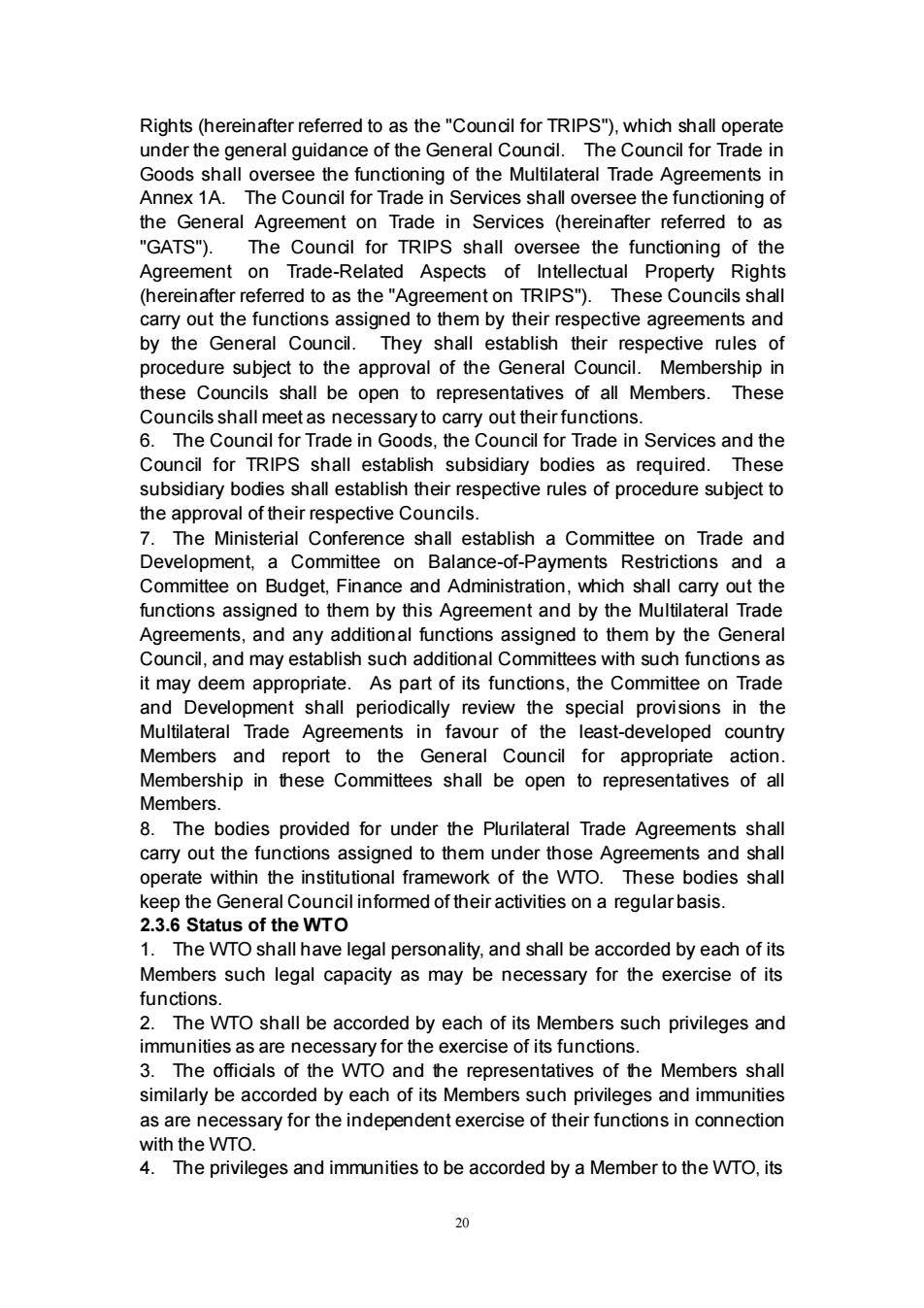
Rights(hereinafter referred to as the"Council for TRIPS"),which shall operate unde r the g general guidance of the Gen ral Cound The Council for Trade in Goods shall oversee the functioning of the Multilateral Trade Agreements in Annex 1A.The Council for Trade in Services shall oversee the functioning of the General Agreement on Trade in Services (hereinafter referred to as "GATS") The council for tRIps shall oversee the functioning of the Agreem ent on Trade-Related Aspects of Intellectual Property Rights r referred to as the"Agreement on TRIPS"). These Councils sha carry out the functions assigned to them by their respective agreements and by the General Council.They shall establish their respective rules of procedure subject to the approval of the General Council.Membership in these Councils shall be open to representatives of all Members. These Councils shall me et as neces ary to( arry out th functions The Council for Trade in Goods,the Council for Trade in Services and the Council for TRIPS shall establish subsidiary bodies as required. These subsidiary bodies shall establish their respective rules of procedure subject to the approval of their respective Councils. The Min enc shall establish a Committe Trade and Development,a Committee on Ba Payments tions and a Committee on Budget,Finance and Administration,which shall camry out the functions assigned to them by this Agreement and by the Multilateral Trade Agreements,and any additional functions assigned to them by the General Council,and m y es ablish such additional cor ittees with such functions 3 it may deem appropriate As part o of its functions,the Committee on Tra and Development shall periodically review the special provisions in the Multilateral Trade Agreements in favour of the least-developed country Members and report to the General Council for appropriate action Membership in these Committees shall be open to rep esentatives of all Members The bodies provided for under the Plurilateral Trade Agreements shal carry out the functions assigned to them under those Agreements and shall operate within the institutional framework of the WTO. These bodies shall keep the General Council informed of their activities on a regular basis. 2.3.6 Status of the WTO The WTOshall have legal personality,and shall be accorded by each of its Members such legal capacity as may be necessary for the exercise of its functions 2.The wTo shall be accorded by each of its members such privileges and immunities as are necessary for the exercise of its functions. The of the WTO re esenta ve of the Members shal similarly be accorded by each of its Members such privileges and immunities as are necessary for the independent exercise of their functions in connection with the WTO. 4.The privileges and immunities to be accorded by a Member to the WTO,its
20 Rights (hereinafter referred to as the "Council for TRIPS"), which shall operate under the general guidance of the General Council. The Council for Trade in Goods shall oversee the functioning of the Multilateral Trade Agreements in Annex 1A. The Council for Trade in Services shall oversee the functioning of the General Agreement on Trade in Services (hereinafter referred to as "GATS"). The Council for TRIPS shall oversee the functioning of the Agreement on Trade-Related Aspects of Intellectual Property Rights (hereinafter referred to as the "Agreement on TRIPS"). These Councils shall carry out the functions assigned to them by their respective agreements and by the General Council. They shall establish their respective rules of procedure subject to the approval of the General Council. Membership in these Councils shall be open to representatives of all Members. These Councils shall meet as necessary to carry out their functions. 6. The Council for Trade in Goods, the Council for Trade in Services and the Council for TRIPS shall establish subsidiary bodies as required. These subsidiary bodies shall establish their respective rules of procedure subject to the approval of their respective Councils. 7. The Ministerial Conference shall establish a Committee on Trade and Development, a Committee on Balance-of-Payments Restrictions and a Committee on Budget, Finance and Administration, which shall carry out the functions assigned to them by this Agreement and by the Multilateral Trade Agreements, and any additional functions assigned to them by the General Council, and may establish such additional Committees with such functions as it may deem appropriate. As part of its functions, the Committee on Trade and Development shall periodically review the special provisions in the Multilateral Trade Agreements in favour of the least-developed country Members and report to the General Council for appropriate action. Membership in these Committees shall be open to representatives of all Members. 8. The bodies provided for under the Plurilateral Trade Agreements shall carry out the functions assigned to them under those Agreements and shall operate within the institutional framework of the WTO. These bodies shall keep the General Council informed of their activities on a regular basis. 2.3.6 Status of the WTO 1. The WTO shall have legal personality, and shall be accorded by each of its Members such legal capacity as may be necessary for the exercise of its functions. 2. The WTO shall be accorded by each of its Members such privileges and immunities as are necessary for the exercise of its functions. 3. The officials of the WTO and the representatives of the Members shall similarly be accorded by each of its Members such privileges and immunities as are necessary for the independent exercise of their functions in connection with the WTO. 4. The privileges and immunities to be accorded by a Member to the WTO, its